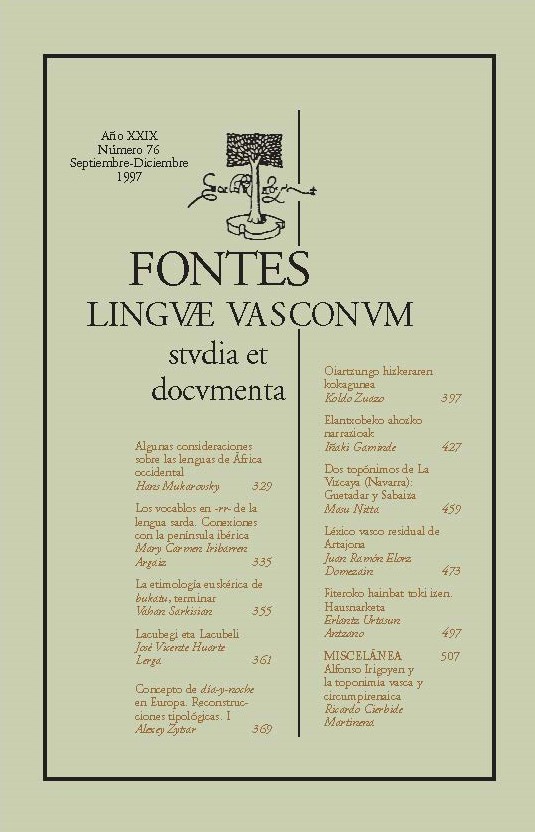Concepto de día-y-noche en Europa: reconstrucciones tipológicas I
Abstract
The author tackles the problematic matter of the designation of the day with the Basque adverb gaur. The unitary formulation day-and-night represents the most exact specialised measure to accurately preclude numerous intermediate nuances. In fact, timetable changes, both seasonal ones and the year change itself, are formalized as of midnight. The priority of the night with reference to day-and-night is a generalized phenomenon that does not adhere to the Germanic-Celtic stem. This was already the case In Eurasia in ancient times, is common in the Hebrew world, and is present in the measurements of the whole civilized world. Such generalised dispersion and frequency cannot be limited to linguistic relationships, but responds to the function of exactness in the measurement of the day-and-night concept.
##about.statistics##
References
A. TOVAR. «La etimología europea del vasco gaur "hoy"» -Via Domitia (Toulouse), I, 1954, pp. 106-108, reimpreso en el: A. TOVAR. El euskera y sus parientes. M. 1959, cap. 6, pp. 81-87 (edición que se alega en este artículo).
H. GAVEL. Gammaire basque. Dialecte navarro-labourdin litteraire. t. I (RIEV, XII), Bayonne, 1928, p. 216.
G. A. KLÍMOV. Diccionario etimológico de las lenguas kartvélicas. M., 1964, en ruso.
, R.M. de AZKUE. Diccionario vasco-español-francés, I-II, Bilbao, 1905.
W. VON WARTBURG. Französisches etymologisches Wörterbuch, B. VII.
KLUGE. Etymologisches Wörterbuch der deutschen Sprache.
L. MICHELENA. Textos arcaicos vascos, M., 1964.
A Dictionary of the English Languaje. New York-London-Toronto, 1898.
V.G. GAK, K.A. GÁNSHINA. Nuevo diccionario francés-ruso. M., 1994, en ruso.
M. GLONTI. «Para la tipología del calendario vasco». Tbilisi, 1988, en ruso.
S.I. OZHEGOV. Diccionario de la lengua rusa. 4 ed., M., 1961, en ruso.
C. GARCÍA TURZA. Sobre la esencia del lenguaje. Logroño, 1992.
L. ZAJDLER. Dzieje zegara. Warzsawa, 1956.
E. ZINNER. Die Geschichte der Sternkunde. 1931. https://doi.org/10.1007/978-3-642-50909-4
A. PICTET. Les origines indoeuropéennes. III, 1877, p. 333.
Yu. Vl. ZYTSAR. «Sobre los numerales 5, 10».-FLV (Fontes Linguae Vascomun), N 60, 1992, pp. 175-186.
J. GRIMM. Deutsche Mythologie. Wien-Leipzig, 1939, verl. K.H. Strohl.
Etymologisches Wörterbuch der Deutschen Sprache. Berlín, 1957.
Etymological Dictionary of the English Languaje. Oxford-London, 1985.
COL. «Christus und die Religionen der Erde. I» (hier D. Wölfel s. 228 f.).
MANA. Introduction à l'histoire des réligions. 2, III (ici J. Vendryes p. 312 s.).
J. HOOPS. Reallexikon der germanischen Altertumskunden. IV, Strassburg, 1918-1919, hier F. Ruhl. Wochentage, s. 557-558.
Etymologisches Wörterbuch des Deutschen. I-III, Berlín, 1989 (Leiung von W. Pfeifer).
Yu. Vl. ZYTSAR. «Reconstrucciones en el dominio del léxico vasco del calendario». Introducción y parte 1.-Macne. Izvestiya de la AC de Georgia, 1984, N 2, pp. 145-159 (en ruso).
Yu. Vl. ZYTSAR. Y Dz. M. DZINDZIJADZE. «Año y circunferencia. Sobre el origen de la división de la circunferencia en 360». Moambe. Soobsheniya de la AC de Georgia, 1987, N 3, p. 649-652, en ruso.
S.A. TÓKAREV. La religión en la historia de los pueblos del mundo. 2. ed. M., 1965, en ruso.
A.L. MONGAIT. Arqueología de la Europa Occidental. Edades de bronce y de hierro. M., 1974, en ruso.
J.M. DE BARANDIARAN. Mitología vasca. M., 1980.
Yu. V. ZYTSAR. Reconstrucciones en el dominio del culto a la luna y a las ánimas (para la etimología del vasco argizazi). Euskera (Bilbo), 29, 1984, f. 2, pp. 731-737.
M. GLONTI. «Sobre los nombres vascos del jueves». Euskera, 29, 1984, f. 2, pp. 743-747.
Copyright (c) 1997 Alexey Zytsar

This work is licensed under a Creative Commons Attribution-NonCommercial 4.0 International License.







